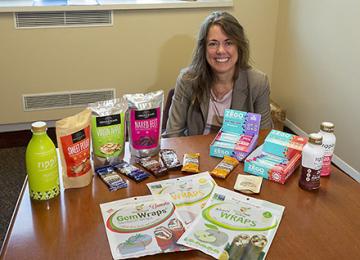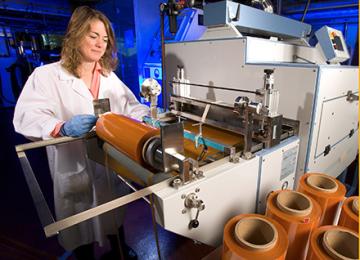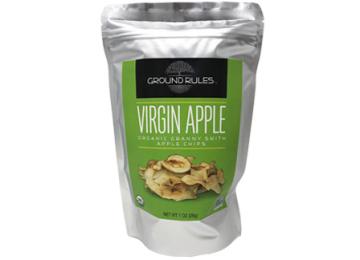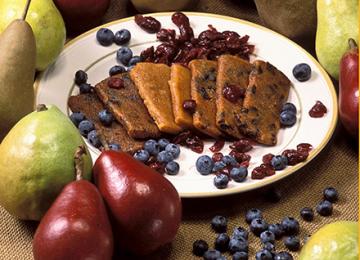Turning Food Waste into Healthful Delights

Tara McHugh, food technologist and director of the ARS Western Regional Research Center, with some of the many products researched and developed by her team in the Healthy Processed Foods Research Unit. (Stephen Ausmus, D4246-1)
Not every apple on the tree will make it to the market. Some are damaged, bruised, or oddly shaped. Other fruits and vegetables with imperfections may suffer the same fate. But instead of being tossed in the garbage, these foods are getting a second chance thanks to scientists at the Agricultural Research Service (ARS) in Albany, CA. They're in the business of turning potentially wasted fruits and veggies into tasty, healthful products for you to enjoy.
Tara McHugh is the director of the Western Regional Research Center (WRRC) in Albany. She and the team in the Healthy Processed Foods Research Unit are experts at solving food-manufacturing problems by using cutting-edge processing technologies.
"Adding value to specialty crops and plant-based waste materials by developing novel, healthy ingredients and functional foods is one of the main focuses of the unit's research," McHugh said. The first objective is to increase the commercial value of plant-based, postharvest waste materials, high in dietary fiber and/or polyphenols, by reprocessing them into healthful foods and food ingredients.
The fruits of the team's labors can be found on grocery shelves throughout the country. Here are a few of their notable achievements.
All Fruit, No Filler
In the early 2000s, McHugh developed the world's first all-fruit bar using a novel processing technology she and her team invented. Each bar is packed with 100-percent fruit and has no preservatives, fillers, or other artificial ingredients. The bars are made of unmarketable fruit that would normally be discarded.
"This technology was needed to manufacture nutritious, value-added, shelf-stable, 100-percent fruit products," McHugh says. "It supports U.S. fruit growers, reduces waste, and increases consumption of healthy foods."
Columbia Gorge Delights, a fruit-grower-owned company in North Bonneville, WA, had an exclusive license on this invention and commercially produced the fruit bars, called Just Fruit, from 2003-2016. The company was able to create 40 new jobs in an area where unemployment was high, McHugh says.
The technology allowed fruit growers to add value to their crop and create new markets, while helping people meet their daily fruit requirements. Each bar provides two servings of fruit.
"More than 5.5 million bars were sold, equating to millions of pounds of fruit being consumed that would otherwise have been thrown away," McHugh says.
The bars were sold all over the world, including in Japan and Canada. In 2016, Columbia Gorge Delights was sold to ZEGO Foods, which continues to manufacture and sell Just Fruit bars.

ARS food technologist Tara McHugh casts carrot edible films in the Healthy Processed Foods pilot plant. This technology was commercialized through a partnership with NewGem Foods. (Peggy Greb, D1148-1)
Wrap It Up With Edible Films
To get more people to eat fruits and vegetables, McHugh and her team invented a way to cast fruit and vegetable purees into edible films that can be used as wrappings and coatings for other foods. The films are excellent barriers to oxygen and moderate barriers to moisture. They also exhibit superior color, flavor, and aroma and have excellent flexible properties and good nutritional value. Furthermore, through the addition of natural antimicrobials, the films can improve food safety.
Working with Origami Foods, which later became NewGem Foods, McHugh co-led the commercialization of fruit and vegetable-based edible films. The patented films are exclusively licensed and sold by NewGem Foods, located in Fife, WA. The company has more than $8.5 million in product sales to date, which equates to more than 15 million servings of fruits and vegetables, according to McHugh. This new technology has created 56 new jobs in a rural area of high unemployment, McHugh says.
The main uses for the edible films are as alternatives to nori on sushi, gluten-free bread and tortilla alternatives, and glaze sheets for hams. These products are sold in retail grocery chains in the United States, Canada, and elsewhere, and are also used in foodservice operations.
McHugh used the same technology in collaboration with East-West Medical Research Institute to develop the first edible fruit straw. In addition, they found that incorporating natural essential oils from oregano, thyme, cinnamon, allspice, clove and lemongrass into apple- and tomato-based films and coatings helped to fight against E. coli O157:H7, Salmonella enterica, and Listeria monocytogenes.

These organic Granny Smith apple chips are made with a patented process developed by ARS that uses infrared blanching and dehydration technology to make 100-percent fruit and vegetable snacks. (Photo courtesy of Treasure8)
Fruits and Veggies To Treasure
Years ago, McHugh's team developed an infrared blanching and dehydration technology, which recently received a patent. The company Treasure8 saw this as a golden opportunity and licensed a suite of ARS patents on the technology for fruit and vegetable snacks.
"We're working with Treasure8, and they have an exclusive license for the patented process to make 100-percent fruit and vegetable snacks, using the infrared blanching and dehydration technology," McHugh says.
Part of the company's success is due to McHugh and her team, according to Timothy Childs, Treasure8 cofounder and CEO. "The successful public-private partnership Treasure8 has formed with the USDA is a testament to Dr. McHugh's ability to help bring clarity and vision to complex, revolutionary applications, such as those that we at Treasure8 are now commercializing," he said.
ARS scientists continue to develop novel technologies to address manufacturing needs for nutritious, value-added, shelf-stable products. "We are constantly working on new ways to improve healthfulness in processed foods through science and partnerships with different companies, universities, growers, commodity organizations, government, and other stakeholders," McHugh said.
This research not only supports small businesses and U.S. growers, but also reduces waste and increases consumption of healthy foods.—By Sandra Avant, formerly with the ARS Office of Communications.
You May Also Like


